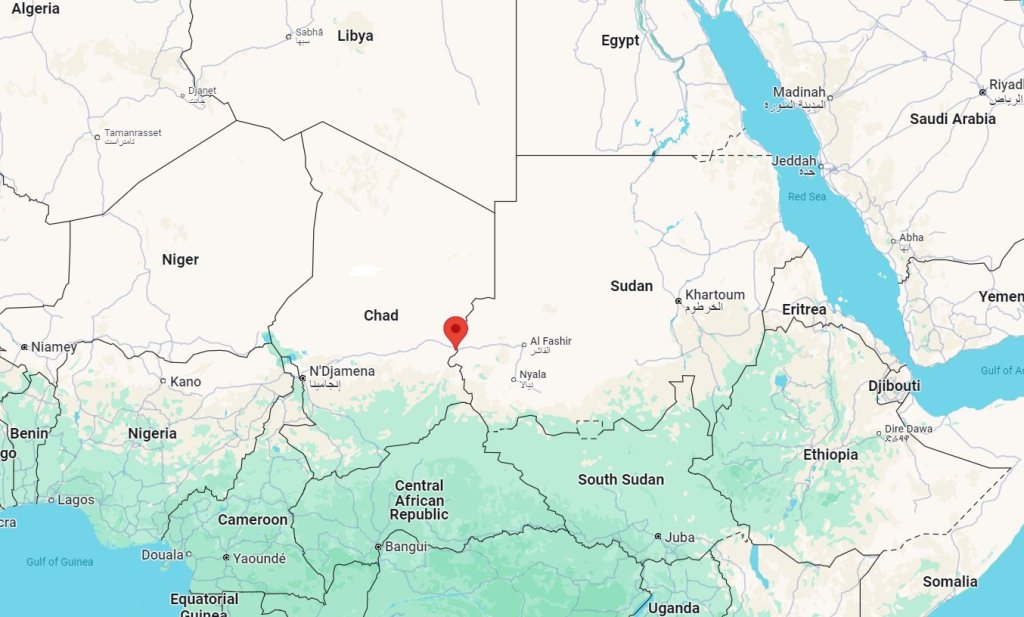The UN refugee agency has warned that more than three million people have fled Sudan, most of them to neighboring Chad, South Sudan and Egypt. UNHCR says the 'unrelenting' violence against civilians targets females in particular.
Nineteen months after fighting broke out in the northern African country of Sudan, the number of displaced people now exceeds three million, the United Nations has said. To put things into perspective, that's an average of 5,000 people every day.
In a press release published last Friday (November 8), UN refugee agency UNHCR noted that 60,000 Sudanese arrived in neighboring Chad in the month of October alone following an "escalation of fighting" in the Darfur region and the "retreat of floodwaters."
According to the UN citing non-governmental organizations, the latest attacks by the Rapid Support Forces (RSF), a paramilitary rebel militia fighting for supremacy with the Sudanese armed forces, are "some of the worst, most extreme violence" since the beginning of the war in April 2023.
'Horrific violations of human rights'
"We are receiving reports of horrific violations of international human rights and humanitarian law, including sexual violence committed predominantly against women and girls," the UN's political chief Rosemary DiCarlo said on Wednesday (November 13) at a UN Security Council meeting in New York.
3,200 of all internally displaced people are pregnant women, according to the United Nations Population Fund, which specializes in the health of women and children.
Seven out of ten refugees who arrived in Chad say they had their human rights violated during their escape, according to a UN press release. Landlocked Chad, one of the world's poorest countries, now hosts more than 700,000 Sudanese, or 24 percent of the total who have fled. Most of them are currently staying in makeshift camps in Chadian border towns like Adre, where around a third (230,000) of all Sudanese refugees are now living. According to UNHCR, more than 80 percent of them in this camp are women and girls.
South Sudan and Egypt shelter even more displaced Sudanese (840,000 and 1.2 million, respectively). According to UNHCR, 650,000 of those who fled to South Sudan are returnees who face an "extremely fragile country" with its own "enormous humanitarian needs."
Smaller numbers of refugees have fled to Libya, Ethiopia, the Central African Republic and Uganda.
Already back in June, the UN called the often overlooked civil war in Sudan the world's "worst displacement crisis" that has now uprooted over 11 million people internally and beyond Sudan's borders.
Last month, the UN warned of "acute levels of food insecurity" and severe risk of famines in 14 regions across the country. "3.7 million children under five [are] projected to suffer from severe acute malnutrition this year alone who are in urgent need of life-saving treatment," according to a UNHCR press release from October 25.

Read AlsoSudanese factions accused of weaponizing hunger as ceasefire talks drag on
Dreaming of Europe
Thousands of Sudanese fled beyond the region and even the African continent. Some as far as Europe. One of them is Musab, which is not his real name. He arrived in Latvia in October 2023.
"Life in Sudan was not good," the 28-year-old told InfoMigrants during an interview in Latvia this September. "There's so much violence. One of my friends died in the war."
When fighting got so bad that he was afraid he might get killed, too, he decided to flee.

Another Sudanese man, Mohamed Salim, has sought asylum in Egypt. Recently he spoke to InfoMigrants Arabic about his hopes to travel from Egypt to Germany.
"Everything in Sudan is bad," Salim told InfoMigrants. He says the situation is so bad that he cannot imagine returning, and he has pinned his hopes on reaching Germany.
"Since I became convinced that Germany is a country of freedoms and full citizenship," Salim explains. "I learned its language and mastered other languages to increase my chances of getting an opportunity, but I still receive rejections for job applications because I am not there."
Salim says he has exhausted all the legal ways he knew to get to Europe and is now considering trying irregular routes to reach his goal. "I hope my arrival in Germany will save my future," he states.
Growing death toll, threat from climate change
Estimates of the death toll range from 25,000 to more than 62,000. The true figure could even be far higher.
Meanwhile, man-made climate change is exacerbating the region's refugee crisis. In a new report published this week, UNHCR says that climate change is a "growing threat to people already fleeing war."
In places like Sudan, climate shocks are interacting with conflict to push those already in danger into even more dire situations, the report warned.
In eastern Chad, for instance, heavy rains and flooding "routinely destroy shelters and basic infrastructure" as well as "contaminate fresh water", according to the report. What's more, internally displaced Sudanese face the risk of further displacement due to the severe flooding that's currently affecting the country.
"Combined with the security risks people face from armed groups along the Sudan-Chad border and limited humanitarian support, the impacts of climate change are exacerbating the already harsh living conditions," the authors wrote.
UN refugee chief Filippo Grandi added that climate change is a "harsh reality" that "profoundly" affects vulnerable people like refugees. "The climate crisis is driving people out of regions that are already home to many people who have fled conflict and insecurity. This further exacerbates their plight and leaves them with nowhere to go for safety," he said.
Read AlsoTens of thousands of migrant testimonies reveal dangers of land routes in Africa
From Sudan to Egypt
Raga Ahmed Abdel Rahman, a 27-year-old Sudanese woman who arrived in Egypt in August, paid the equivalent of around 780 euros to travel in a pick-up truck with 16 other refugees, she told news agency AFP.
The 36-hour grueling desert journey was "exhausting and terrifying", Abdel Rahman said. "We were constantly afraid of being stopped by RSF forces," she added, referring to the Rapid Support Forces.
Hundreds of people fleeing Sudan arrive in Egypt every day, AFP reported on Sunday (November 10) citing a UN official. The displacement crisis caused by Sudan's war has placed "immense pressure on Egypt's resources and infrastructure," UNHCR Egypt said on Friday.
Bleak future
Meanwhile, UN representatives warn that the already catastrophic situation in Sudan and the region could deteriorate even further.
"As the end of the rainy season approaches, the parties continue to escalate their military operations, recruit new fighters and intensify their attacks," UN representative Rosemary DiCarlo said at Tuesday's UN Security Council meeting. She also accused allies of Sudan's warring military and paramilitary forces of "enabling the slaughter" by, among other things, providing a "steady flow of weapons into the country."
Leni Kinzli, Head of Communications and Spokesperson for the WFP in Sudan told InfoMigrants that the situation was even more dire because many of those people who had fled were forced to uproot over and over again. "People are leaving everything behind again and again -- some are displaced up to four or five times. Each time they run for their lives they lose what little they had left -- becoming more vulnerable and food insecure along the way."
Read AlsoEgypt: Sudanese fear deportation following new regularization law
